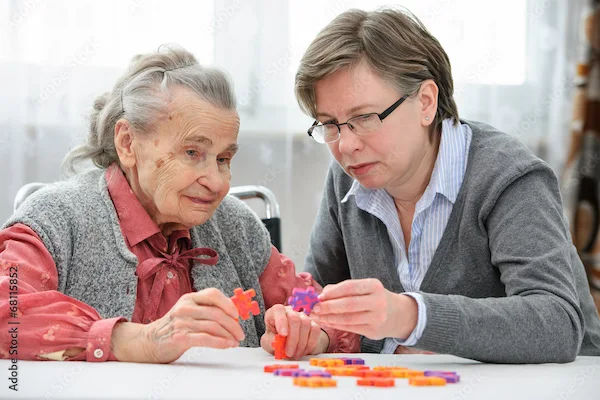Dementia: Causes, Symptoms, Treatment and Prevention
Learn about dementia, its causes, symptoms, treatment options, and preventive measures. Understand how early diagnosis and lifestyle changes can help manage this condition and improve quality of life.

Written by Dr.Sonia Bhatt
Last updated on 3rd Jul, 2025

Dementia is not a specific disease but a term used to describe a decline in mental function.It involves a significant deterioration from a previously higher level of cognitive abilities, affecting daily life. A person with dementia typically experiences a decline in at least two of the following areas:
Memory
Reasoning
Language
Coordination
Mood
Behaviour
Types of Dementia
Dementia is classified into three main groups:
1. Primary Dementia
It is a type where dementia is the main condition. The types of primary dementia are as follows:
Alzheimer’s Disease: The most common form, characterised by abnormal protein build-up (tau and amyloid) in the brain. Symptoms include memory loss, confusion, and behavioural changes. Affects mostly older adults.
Vascular Dementia: Caused by strokes or blood vessel blockages in the brain. Symptoms include memory issues, confusion, and difficulty concentrating.
Lewy Body Dementia: Results from protein clumps (Lewy bodies) affecting nerve cells. Symptoms include movement problems, hallucinations, memory issues, and sleep disturbances.
Frontotemporal Dementia (FTD): Affects the frontal and temporal lobes, causing personality changes, language loss, and motor issues. Often occurs in people aged 45–64.
Mixed Dementia: A combination of two or more types of dementia, most commonly Alzheimer’s and vascular dementia.
2. Secondary Dementia
It is caused by another disease or condition. The causes of secondary dementia are as follows:
Huntington’s Disease: Caused by a defective gene, leading to movement control problems, memory issues, and personality changes.
Parkinson’s Disease: Later stages can lead to dementia, with symptoms like memory issues, hallucinations, and difficulty speaking.
Creutzfeldt-Jakob Disease: Caused by prions, leading to rapid mental decline, confusion, and behavioural changes.
Wernicke-Korsakoff Syndrome: Resulting from thiamine deficiency, typically due to alcohol use disorder. Symptoms include memory loss, double vision, and coordination issues.
Traumatic Brain Injury: Repeated head trauma can cause dementia symptoms years later, such as memory loss and mood changes.
3. Reversible Dementia-Like Symptoms
It is caused by conditions that may be treated and reversed. The symptoms are as follows:
Normal Pressure Hydrocephalus (NPH): Fluid build-up in the brain causing balance issues, forgetfulness, and mood swings. Treatable with surgery.
Vitamin Deficiency: Lack of vitamins B1, B6, B12, copper, or vitamin E can mimic dementia.
Infections: Conditions like HIV, syphilis, Lyme disease, and even urinary tract infections in older adults can cause dementia-like symptoms.
Metabolic and Endocrine Issues: Conditions like Addison's disease, Cushing’s disease, thyroid problems, and exposure to heavy metals can mimic dementia.
Medication Side Effects: Certain medications, including sleep aids, anti-anxiety drugs, and pain relievers, may cause dementia-like symptoms.
Other Causes: Brain tumours, brain bleeds (subdural hematomas), and some central nervous system infections can also lead to cognitive symptoms.
Causes of Dementia
The causes of dementia are as follows:
Damage to Nerve Cells: Dementia is caused by damage or loss of nerve cells and their connections in the brain. The symptoms vary depending on which area of the brain is affected.
Brain Protein Deposits: Some types of dementia are grouped based on the protein deposits found in the brain, such as amyloid plaques or tau tangles.
Brain Area Affected: Dementia may be classified based on the specific part of the brain that is damaged.
Dementia-like Symptoms from Other Diseases: Some diseases exhibit symptoms similar to dementia, such as infections, metabolic conditions, or brain injuries.
Medication Side Effects: Certain medications can cause side effects that mimic dementia symptoms.
Vitamin or Mineral Deficiencies: Lack of specific vitamins or minerals (e.g., vitamin B12) can result in dementia-like symptoms. Treatment for deficiencies can improve these symptoms.
Risk Factors of Dementia
The risk factors of dementia are as follows:
1. Unchangeable Risk Factors
Unchangeable risk factors includes:
Age: The risk increases with age, particularly after 65, though dementia can occur earlier.
Family History: A family history of dementia increases your risk, but many with a family history do not develop it.
Down Syndrome: Individuals with Down syndrome are more likely to develop early-onset Alzheimer's by middle age.
2. Changeable Risk Factors
Changeable risk factors includes:
Alcohol Consumption: Excessive alcohol intake increases the risk of dementia, particularly early-onset forms.
Cardiovascular Health: Obesity, high blood pressure, high cholesterol, and diabetes contribute to dementia risk.
Hearing and Vision Loss: Untreated hearing and vision loss can increase dementia risk. Correcting these can help reduce it.
Depression: Late-life depression may indicate an increased risk of dementia.
Air Pollution: Exposure to pollutants, particularly from traffic exhaust and burning wood, is linked to higher dementia risk.
Head Trauma: Severe head injuries, especially repeated ones, increase the risk of dementia, particularly Alzheimer's.
Sleep Disorders: Conditions like sleep apnea can elevate the risk of developing dementia.
Vitamin Deficiencies: Low levels of vitamin D, B6, B12, and folate may raise dementia risk.
Medication Use: Certain medications, such as sleep aids (e.g., diphenhydramine) and those for urinary urgency (e.g., oxybutynin), can impair memory and contribute to dementia symptoms.
Symptoms and Stages of Dementia
Dementia symptoms vary depending on the cause. Common symptoms include:
1. Cognitive Changes
Symptoms depending on cognitive changes includes:
Memory loss
Difficulty with communication and finding words
Trouble with visual and spatial abilities
Issues with reasoning and problem-solving
Difficulty performing complex tasks
Trouble with planning and organising
Poor coordination and movement control
Confusion and disorientation
2. Psychological Changes:
Symptoms depending on psychological changes includes:
Personality changes
Depression
Anxiety
Agitation
Inappropriate behaviour
Paranoia
Hallucinations
Diagnosis
Diagnosis of dementia can be done through the following:
1. Medical History and Physical Examination
A healthcare professional will review your medical history and symptoms, and perform a physical examination. A close family member or friend may also be asked to provide input on your symptoms.
2. Cognitive and Neuropsychological Tests
These tests assess various aspects of thinking ability, including memory, orientation, reasoning, judgment, language skills, and attention. A range of tests may be used to evaluate cognitive function.
3. Brain Imaging and Other Tests
Brain imaging and other tests includes:
CT or MRI scans: These can detect conditions such as stroke, bleeding, tumours, or fluid buildup (hydrocephalus).
PET scans: These scans reveal patterns of brain activity and can help identify the presence of amyloid or tau proteins, which are characteristic of Alzheimer's disease.
Laboratory tests: Blood tests can check for conditions like vitamin B-12 deficiency or thyroid problems that might affect brain function. In some cases, spinal fluid is analysed for infection, inflammation, or markers of degenerative diseases.
4. Psychiatric Evaluation
A mental health professional may assess whether depression or another mental health condition is contributing to the symptoms.
Treatment Options
Treatment options for dementia includes:
1. Medications
The medications that help in treating dementia are as follows:
Cholinesterase inhibitors (e.g., donepezil, rivastigmine): Boost memory-related chemicals, used for Alzheimer's and other dementias. Side effects may include nausea, dizziness, and sleep issues.
Memantine: Regulates glutamate for memory, often with cholinesterase inhibitors. Common side effect: dizziness.
New treatments (Lecanemab, Donanemab): Slow cognitive decline in mild Alzheimer's by preventing amyloid plaques. Administered via IV with possible side effects like flu-like symptoms or brain swelling. Regular MRIs recommended.
Other medications: For symptoms like depression, sleep issues, or agitation.
2. Non-Drug Therapies
Non-drug therapies that help in treating dementia includes:
Occupational therapy: Creates a safer home environment and teaches coping strategies.
Environmental adjustments: Reducing clutter and securing dangerous items improves focus and safety.
Simplified tasks: Breaking tasks into steps helps manage confusion and maintain routine.
Prevention and Management
Dementia can be prevented and managed through the following:
Exercise: Regular activity improves strength, balance, and brain health, and may slow cognitive decline.
Diet: A balanced diet with fruits, vegetables, fish, whole grains, and healthy fats supports brain health.
Sleep: Establish a calming routine, limit caffeine, encourage physical activity, and use night lights to aid sleep.
Engage in activities: Participate in enjoyable activities like dancing, painting, or cooking to maintain focus and emotional connections.
Communication: Speak slowly with clear instructions and use gestures to aid understanding.
Mental stimulation: Encourage cognitive activities that maintain mental well-being.
Plan for the future: Develop a care plan, considering legal, financial, and long-term care needs.
Health management: Regularly manage other health conditions like heart disease, diabetes, or depression to improve overall well-being.
Conclusion
In conclusion, dementia is a complex condition with various causes and types, affecting cognitive, behavioural, and psychological functions. While there is no cure for most forms of dementia, early diagnosis, appropriate treatments, and lifestyle changes can help manage symptoms and improve quality of life. Healthy lifestyle choices, such as regular exercise, a balanced diet, and mental stimulation, can play a key role in preventing or delaying the onset of dementia. Supportive therapies and careful management of other health conditions also contribute to the well-being of individuals with dementia and their caregivers.
Consult Top Neurologist
Consult Top Neurologist
Dr. Lakshaman K
Neurologist
19 Years • MBBS,MS General Medicine,MCH Neurosurgery
Bengaluru
R V speciality Clinic, Bengaluru

Dr. Joydeep Biswas
Neurologist
15 Years • MBBS, DNB General Medicine, DNB Neurology
Barasat
Diab-Eat-Ease, Barasat

Dr. Uddalak Chakraborty
Neurologist
8 Years • MBBS, MD(GENL.MED.),DM(NEUROLOGY)
Kolkata
MCR SUPER SPECIALITY POLY CLINIC & PATHOLOGY, Kolkata
Dr. Annakula Ramu
Neurologist
7 Years • MBBS, MD General Medicine, DM Neurology
Jagtial
Sairam Neuro and Children Hospital, Jagtial

Dr. Uddalak Chakraborty
Neurologist
8 Years • MBBS,MD(GENL. MED.),DM(NEUROLOGY)
Kolkata
VDC Clinic, Kolkata